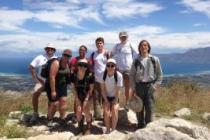UNIVERSITY SEED GRANT TO FUND ARCHAEOLOGICAL DISCOVERY
A total $34,000 awarded by the university to Jorge Bravo, assistant professor of classics in the College of Arts and Humanities (ARHU), will help fund efforts to continue archeological exploration of the ancient Greek port of Kenchreai.
Bravo will travel to Greece in the summer to conduct preliminary investigations in new areas of Kenchreai, the eastern port of ancient Corinth. The work is the first part of Bravo’s larger plan to seek permits from the Greek government for further excavation and to secure future grants.
Funding, which is being provided by the Division of Research, ARHU and the Department of Classics, will help to pay for soil coring and GIS modeling of the harbor. The university’s support will also help sustain a field school for undergraduate and graduate students to continue to explore ancient Greek culture, a program he helped develop with an earlier $5,000 seed grant from ARHU.
Bravo said that the coring work will help researchers define what the environment was like for the area’s settlers and how they interacted with it as it changed over time. A geophysical survey using ground-penetrating radar and other methods will also help give researchers an idea of what lies beneath the earth’s surface. Corinth was a thriving commercial area from as early as about 700 B.C. through the Roman Empire to around 500 A.D., but as Bravo explained, the port was forced to move during that time as the environment changed.
“The general suspicion is that it was a process of silting up of the harbor over time,” Bravo said.
Bravo co-directs the Kenchreai Excavations along with Joseph L. Rife, associate professor of classics and anthropology at Vanderbilt University. The Center for Hellenic Studies in Washington, D.C. also supports the project.
Kenchreai was first explored by American archeologists in the 1960s. Bravo said that he became interested in the site after collaborating with others who had also worked in the area. Funding will help build collaborations between the university’s departments of geography, anthropology, history, classics and others.
“It’s really building collaborations between the humanities and the other schools,” Bravo said.
In addition to the new seaside excavation work, he said, students attending the four-week field school will also have the opportunity to explore remains believed to have served as an ancient residence and warehouse, nearby Roman tombs and other sites and museums in the region.
For more information about the field school in Greece and how to apply, visit: http://globalmaryland.umd.edu/offices/education-abroad/program/11005.





